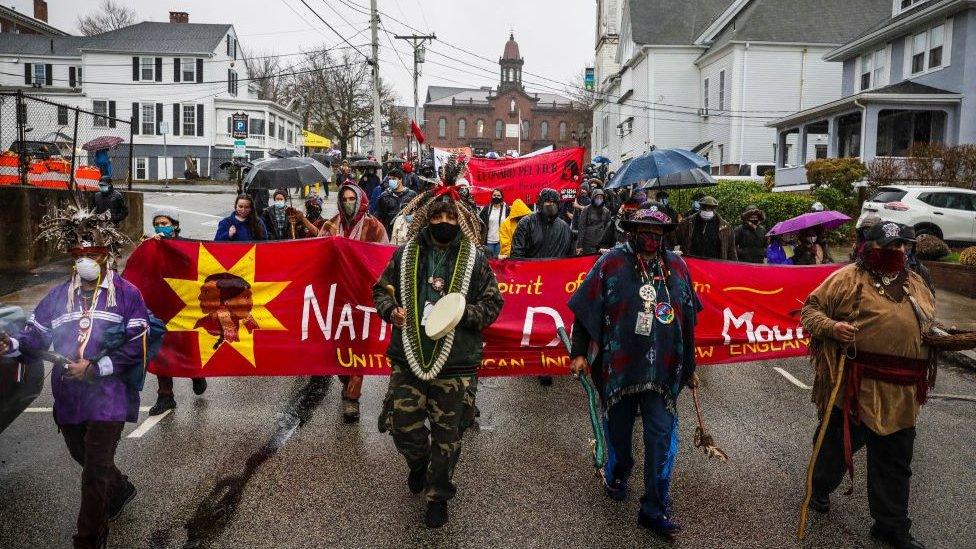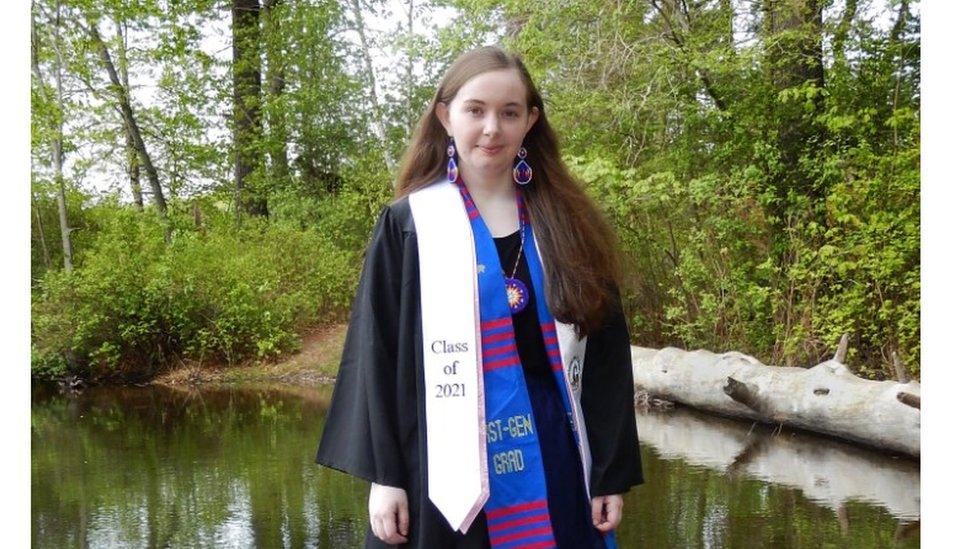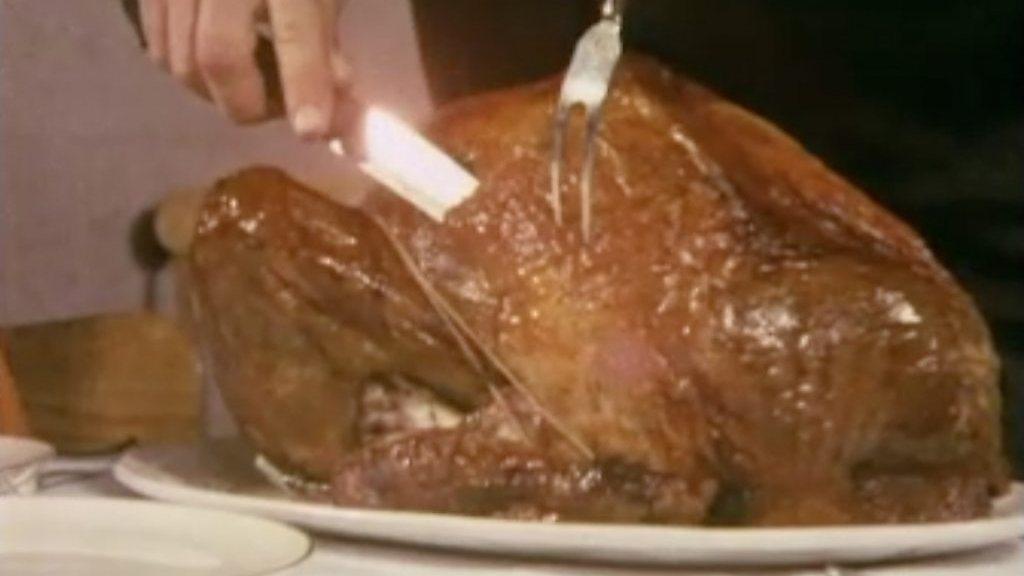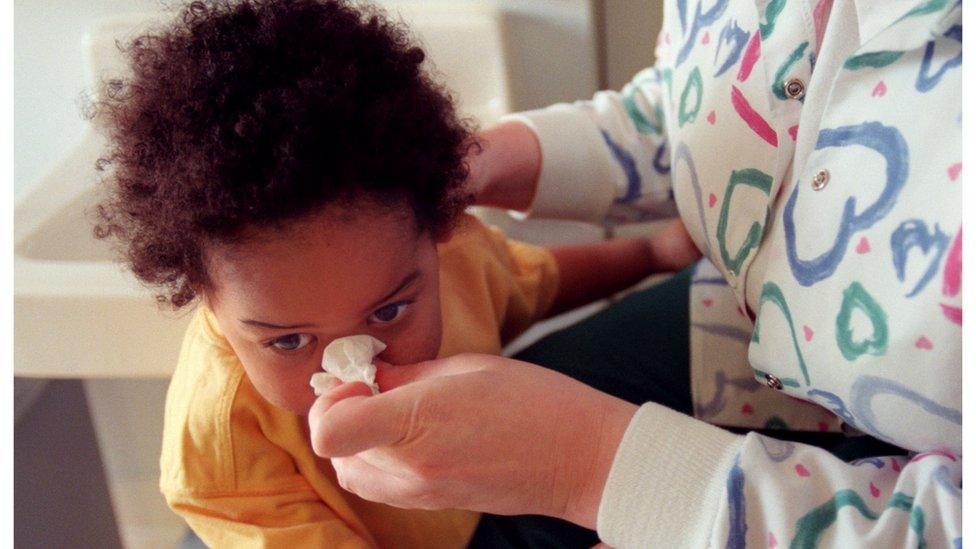Thanksgiving: Why some push back against the holiday's 'mythology'
- Published

A National Day of Mourning in Plymouth, Massachusetts, has been marked since 1970.
After Christmas, Thanksgiving is America's second favourite holiday, opinion polls suggest. But for many Native Americans and Alaska Natives, their relationship with the day is complicated - and their celebrations a bit different.
As many Americans prepare for a massive holiday meal, the setting sun on Thanksgiving's eve will mark the last time Kisha James eats for nearly 24 hours.
She will not be in the kitchen basting a turkey, baking macaroni and cheese, or sprinkling sugar on pies either. Ms James will be in mourning.
For her, the day is a painful reminder of an ugly chapter in American history; a symbol of empty promises, a story whose retelling tends to gloss over the undesirable details of colonisation.
"It's frustrating. It's saddening," said Ms James, a member of the Wampanoag tribe, who lives in Massachusetts. "Some years it's angering."
"We don't have any issues with people sitting down with their family and giving thanks," Ms James said. "What we do object to is the Thanksgiving mythology."
The origin of the Thanksgiving holiday dates back to a harvest feast held in 1621 between the Wampanoag, a Native tribe who occupied the land long before, and the newly settled English colonists in America.
The gathering is widely seen as a celebration of the alliance between the two groups, but leaves out the ways in which those ties were broken.
In the years after that harvest feast, foreign-born diseases arriving from Europe killed many Native Americans.
Others died during conflict with English settlers seeking to gain control of their land. The US government sought to forcibly assimilate children at over 400 government boarding schools operated between 1819 and 1969.
One in three Native Americans currently lives in poverty, according to Northwestern University's Institute for Policy Research, earning a median income of $23,000 (£19,000) a year.
'Whose land? Our land'
The myth, Ms James said, ignores those realities.
Instead of referring to the holiday as Thanksgiving, some, like Ms Smith, recognise 24 November as National Day of Mourning. It has been celebrated in Plymouth, Massachusetts every year since 1970.
For those in attendance, the day begins with an opening prayer ceremony at a historic site named Cole's Hill, a cemetery holding the graves of some of America's earliest settlers.

Kisha James, a member of the Wampanoag tribe, says Thanksgiving celebrations gloss over the painful reality of colonisation for Native people in America
Afterward, there are speeches, and a march through the streets where the chant, "Whose land? Our land", can be heard.
Across the country, each November since 1975, others meet at Alcatraz Island in San Francisco.
They celebrate an event called Indigenous Peoples Thanksgiving Sunrise Gathering. Some refer to it as "Un-Thanksgiving Day".
Historians attribute the rise in activism for Native Americans in the 1970s to momentum driven by Black Americans during the civil rights movement the decade prior.
These events are meant to honour the Native Americans who occupied the land before the arrival of European settlers.
They also draw awareness to what University of Arizona anthropology professor Edward Jolie calls "historical traumas", like what was done to Native Americans in the wake of the Indian Removal Act, signed into law by President Andrew Jackson in 1830.
During the 1830s, roughly 100,000 Native Americans were forcibly moved from the southeast region of the US to areas west of the Mississippi River. It is estimated that around 15,000 died on the journey, known today as the Trail of Tears.
Mr Jolie's grandmother, born in 1912, received first-hand accounts from an elderly relative who survived the Trail of Tears. Those stories of "death and starvation" were later passed down to Mr Jolie, a descendant of the Oglala Lakota and Hodulgee Muscogee tribes.
"That's something that I think a lot of people overlook or don't appreciate, just how raw and very real and ever present these types of historical traumas are for a lot of Native peoples," he said.
First-hand stories were told directly to Mr Jolie, too, from the same grandmother who later shared her experiences with him about her time as a student at an "American Indian" boarding school.
Mr Jolie said her stories were filled with "a lot of really unpleasant things".
In May, the US Department of the Interior released a report describing the former federal boarding schools as places "rampant" with physical and sexual abuse, overcrowding, malnourishment and disease - facts which the report said were "well-documented".
The deaths of at least 500 Native children were also documented in the report, a number expected to rise as the US government continues to look into the "troubled legacy" of those institutions.
A brief history of Thanksgiving
This fraught history, Mr Jolie said, is why the Thanksgiving holiday for some - when only reflected upon as a happy gathering between Pilgrims and Native Americans - is a "painful reminder".
Still, he says it is his favourite holiday, offering the opportunity to spend time with family and enjoy dishes like green bean casserole.
Mr Jolie does, however, have a few hopes for the future - that as people continue to gather, celebrate and be thankful, they will do so "with a healthy recognition of the past".
Related topics
- Published23 November 2017

- Published30 November 2022
